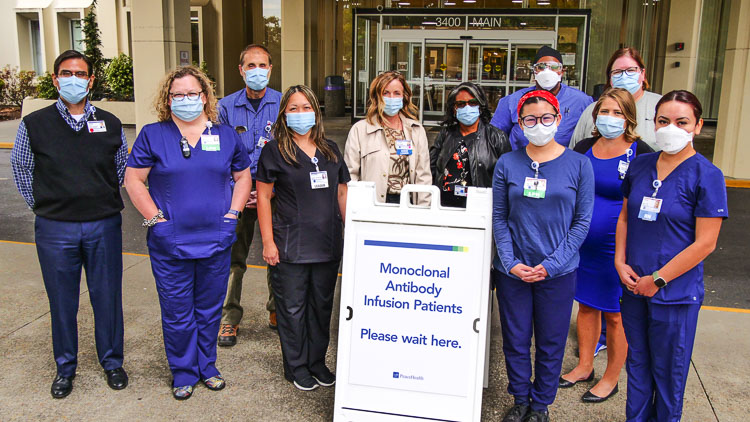Patients must have a provider referral to be eligible for treatment
PeaceHealth is now offering monoclonal antibody IV therapy in southwest Washington. This therapy is a promising treatment for patients at risk for severe complications from COVID-19. In southwest Washington, PeaceHealth will initially provide the treatment at PeaceHealth Memorial Urgent Care at 3400 Main Street in Vancouver. Patients must have a provider referral to be eligible for treatment.

“This is the first community monoclonal therapy clinic in all of southwest Washington,” said Shaun Harper, MD, chief medical officer of PeaceHealth Medical Group. “Monoclonal antibody therapy has been proven to reduce hospitalizations in about 70 percent of high-risk, COVID-positive patients. The goal of the treatment is to prevent hospitalizations, reduce viral loads and lessen symptom severity. PeaceHealth is committed to providing access to this potentially life-saving therapy to anyone in our community who could benefit.”
Dr. Harper says the treatment is not a cure and does not provide long-term immunity against COVID-19. “The best protection against COVID-19 continues to be immunization with our safe and effective vaccines.”
Monoclonal antibody therapy received Emergency Use Authorization from the Federal Drug Administration in November of 2020 for certain groups of non-hospitalized COVID-19 patients. A form of immunotherapy traditionally used for patients with cancer and other diseases, monoclonal antibody treatment has shown to be very effective for patients who have mild to moderate symptoms from COVID-19 but a high risk of complications. The treatment continues to be active against the delta variant. Monoclonal antibodies are immune, lab-produced molecules designed to mimic the body’s natural response to infection. With COVID-19, these antibodies are made to recognize and bind to a part of the SARS-Co-V2 virus—the so-called spike protein—that enables it to infect human cells.
PeaceHealth is offering the combo drug therapy REGEN-COV (Carsirivimab/Imdevimab). Patients receive the antibodies through a 20-minute intravenous infusion followed by an hour of observation.
Monoclonal antibody treatment may be appropriate for patients with mild to moderate COVID-19 symptoms or those with known contact to COVID-19 and a high risk of developing serious complications. It may be given to anyone age 12 or over who also meets at least one of the following criteria:
- 65 years of age or older
- Cardiovascular disease, including congenital heart disease, or hypertension
- Chronic lung disease, including COPD, moderate to severe asthma, interstitial lung disease, cystic fibrosis, pulmonary hypertension
- BMI above 25 or, if age 12-17, a BMI greater than 85th percentile for age and gender based on CDC growth charts
- Chronic kidney disease
- Pregnant
- Diabetes
- Sickle cell disease
- Receiving immunosuppressive treatment or have an immunosuppressive disease
- Neurodevelopmental disorders, such as cerebral palsy, or other conditions that confer medical complexity (for example, genetic or metabolic syndromes and severe congenital abnormalities)
- Medical-related technological dependence, such as tracheostomy, gastrostomy or positive pressure ventilation
Click to view the Emergency Use Authorization Fact Sheet for Patients which provides additional information about monoclonal antibody therapy. Any additional questions should be directed to one’s primary care physician.





Great to see more treatments offered to some patients. Immune system boosters like healthy fruits and vegetables, green tea, Vitamin C and D3, zinc, Quercetin, slow release Melatonin at night, antiseptic mouthwash gargle (without swallowing), fresh air and prayer are accessible to many, and have helped some stay healthy, or helped in recovery.
VAERS data by the CDC shows a total of 701,561 reports of adverse events from all age groups following COVID vaccines, including 14,925 deaths and 91,523 serious injuries between Dec. 14, 2020 and Sept. 10, 2021. Residents should learn about these serious injuries and deaths after vaccination. Damaging adverse events after vaccination include heart attacks, and heart inflammation, blood clots, strokes, neurological conditions and movement disorders, anaphylaxis, miscarriages, amputations, and deaths.
NCAA Student Golfer Has Heart Disease after COVID Shot – Offered Bribe to Silence StoryA 16-year old young man died after COVID vaccination
In an exclusive interview with The Defender, Sarah (VAERS I.D. 1354500) and her mother, Marie Green, said they feel helpless because nobody will acknowledge Sarah’s vaccine injury and “nobody can help them.”
It’s up to every person to research and consider for themselves, with advice from healthcare providers, how to get and stay healthy.
Good to see more treatments offered.
It seems too early to state that fast tracked vaccines are “safe”. VAERS data released by the CDC shows a total of 701,561 reports of adverse events from all age groups following COVID vaccines, including 14,925 deaths and 91,523 serious injuries between Dec. 14, 2020 and Sept. 10, 2021.
This NCAA Student Golfer Has Heart Disease after a COVID Shot and says he was not informed of these serious risks prior to vaccination.In this video report Ernest Ramirez talks about the death of his 16-year-old son after taking the Pfizer shot,
It’s good to see another treatment available to some patients.
It seems too early to know whether these fast tracked vaccines are “Safe”. VAERS data released Sept. 17 by the CDC showed a total of 701,561 reports of adverse events from all age groups following COVID vaccines, including 14,925 deaths and 91,523 serious injuries between Dec. 14, 2020 and Sept. 10, 2021. See ChildrensHealthDefense article for details on the types of adverse events reported, and ages of those who filed reports..
No matter how many times someone like Dr. Harper repeats “safe and effective,” without providing evidence, portions of the public will remain skeptical and untrusting of these vaccines and doctors like Harper.
Why don’t you identify yourself? We’re skeptical of you because you are not providing any facts. Are you a doctor?